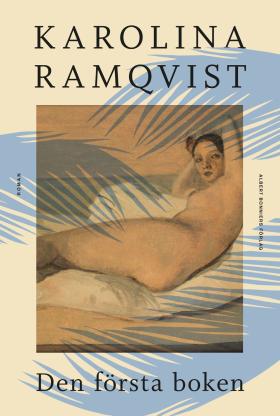
Den första boken
(The First Book)
by Karolina Ramqvist
reviewed by Emma Olsson
If you were to analyse your first love, excavate its foundation and dig tunnels into its emotional nooks and crannies, leave no rock unturned – would you come away any wiser?
Would it all, suddenly, make sense?
This question has been floating around my head since I finished Karolina Ramqvist’s latest novel, The First Book, which was nominated for the 2024 August Prize. It grabbed me by the heart and twisted it around like only the best love stories can.
This is a story told in hindsight, but it is also a story told in the immediate present, and the immediate past, and the far past, and the murky future. It is a story that defies tenses, as love defies time. Our deepest, darkest feelings found only in love do not belong to a past, present, or future. They leap through time and pull us back, like a sinker, which is how Ramqvist’s narrator describes the weight of her first love and the place that informed it.
The novel begins in a singular moment explored in the fullest detail. We meet a woman waking up in bed next to a man on their last day together, a moment we will return to again and again as the sensual baseline of the story, sensual in its languorous and almost painstakingly slow descriptions of smells, sights, sounds, and touches. We learn stories from their past and reflections from the woman’s future, but always return to that moment of trying to make time stop.
The day beckons and with it, the intuition that after today, after she leaves the bed and boards the plane home and resumes her other life, she will never see the man again. The man is Paul from the village in Jamaica where the couple finds themselves; the woman is unnamed, from Sweden, presumably (the country is never named), and our narrator.
From this moment of unspoken feelings and the anticipation of goodbye, we learn the story of the couple: how they met, how their relationship has grown and shrunk and shifted, how the woman much later – decades later – feels about it all (but if you’re expecting emotional conclusions, you won’t find them here).
This could be the story of a writer, a creative exile seeking purpose and inspiration in new places, new experiences. The narrator, who travels to Jamaica for the first time at only eighteen, develops her identity as a writer alongside her identity as a lover. The two cannot be separated.
This could also be a less personal story, a societal one, as the narrator encounters the everyday violence her sex exposes her to, both abroad and in her home country.
Or one about the implications of a white woman dating a black man from a place where people like her have long sought out sexual adventures they can’t find at home. This is a common trope and the narrator is aware of it. She watches with shame as older white women comb the beach for young local men to sweep them away on their island adventures, and there is an air of exotification to the novel: the narrator is almost obsessed with Jamaica, its culture and people representing the polar opposite of her home. Her relationship with Paul is different from the older white women’s, she thinks – she is younger than him and no sugar mama – but in a country that wears its dark history on its sleeve, it’s hard to have a love story in a vacuum.
But don’t the best love stories feel that way? Like everything happening around you is just noise, and all that really matters is the bubble you’ve created with this person?
In the midst of all the possible stories about this couple and this place, there is a love story so raw it becomes a living object. You can practically feel the pages beat like a heart in your hands. The love story overpowers all the rest, but it doesn’t eradicate them. It simply sweeps them all up in its spell, with a breeze originating somewhere far away in some ocean, although it's difficult to know which.
Ramqvist’s knack for the multifaceted portrays all the complexities, contradictions and celebrations of first love. Her prose is poetic and drifting; one thought gives way to another and reflections on violence and power coexist with belonging and what it means to be in a relationship.
And what does it mean? To be in a relationship, to be in love, to share your life with another person? We get the impression that all these years later, the narrator is still searching for answers in memories. She is eternally trying to find the right words.

Den första boken
Albert Bonniers Förlag, 2024, 280 pages
Foreign Rights: Paloma Agency
Karolina Ramqvist has published a number of novels, including the critically acclaimed The White City. She has also written short stories, film scripts, non-fiction and essays, and was formerly Editor of Arena magazine. In 2015 was awarded the prestigious P.O. Enquist Literary Prize. An extract from Karolina Ramqvist’s Bröd och mjölk (Bread and Milk), translated by Saskia Vogel, was published in SBR 2022:1. Her previous novel Flickvännen (The Girlfriend) was reviewed in SBR 2010:1 and Alltings början (The Beginning of Everything) in SBR 2013:1.
